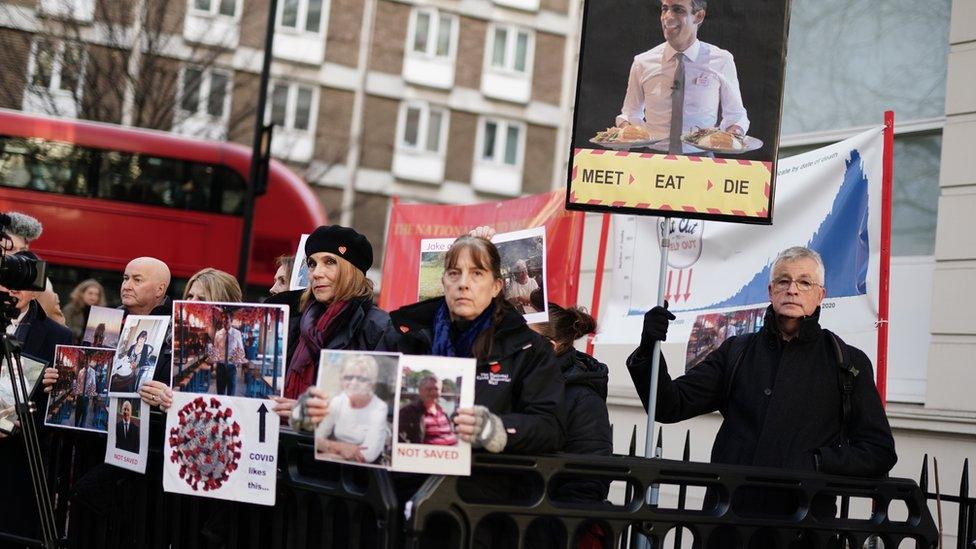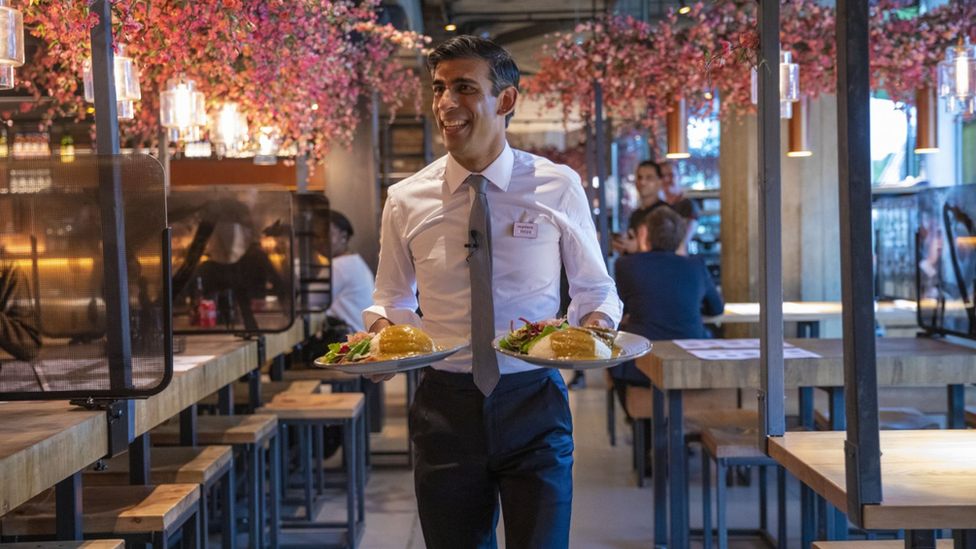Covid inquiry: Eat Out To Help Out curbed devastating job losses - PM
- Published
Watch: Defending Eat Out to Help Out - Rishi Sunak's day at the Covid inquiry
Rishi Sunak has robustly defended his Eat Out To Help Out scheme, implemented in summer 2020, saying it prevented "devastating" job losses.
The scheme encouraged people to attend pubs and restaurants by subsidising meals after lockdown rules were eased.
Mr Sunak said it was introduced after the safe reopening of restaurants.
He dismissed criticism that senior advisers were not consulted, saying they had had "ample opportunity" to raise concerns.
In previous sessions of the inquiry Matt Hancock and Sir Patrick Vallance - the health secretary and the government's chief scientific adviser during the pandemic - have both said they did not know about the Eat Out To Help Out Scheme before it was announced.
The inquiry has also been told that chief medical officer Sir Chris Whitty referred to the scheme as "eat out to help out the virus" and Sir Patrick said it was "highly likely" to have fuelled deaths.
However, Mr Sunak - who was chancellor during the pandemic - strongly backed his decision to introduce the scheme.

More on Covid and the Covid Inquiry

He said it was announced on 8 July and came into force at the beginning of August, and that in that period the chief medical officer had identified children returning to school, and winter, as "two significant risk moments".
"He did not mention Eat Out To Help Out," Mr Sunak said.
He also argued it was a "micro policy" introduced along with other safety measures such as table-only service, contactless payments and one-way systems.
"This was a very reasonable, sensible policy intervention to help safeguard those jobs in that safe reopening.
"I didn't believe that it was a risk. I believe it was the right thing to do.
"All the data, all the evidence, all the polling, all the input from those companies suggested that unless we did something, many of those jobs would have been at risk with devastating consequences for those people and their families."
He added that the evidence "conclusively demonstrates that this was in no way, shape or form responsible for a second wave".

Protestors gathered outside the inquiry where Mr Sunak was giving evidence

Rishi Sunak served food at Wagamama as part of a promotional event for Eat Out to Help Out
Mr Sunak was also asked about claims the Treasury had been nicknamed the "pro-death squad" due to its stance on keeping hospitality and retail sectors open.
The prime minister said that wasn't "a fair characterisation", adding that the Treasury had worked "very hard" and "done things to save millions of people's livelihoods".
He argued that the sectors most impacted by the lockdown, such as retail and hospitality, were more likely to employ "the most vulnerable in society" such as those on the lowest incomes.
He said trying to protect jobs in those areas was a "matter of social justice".
The inquiry has also heard criticism about Boris Johnson's leadership style, with advisers saying he had a tendency to change his mind.
However, Mr Sunak defended his former boss, saying his interactions with No 10 "felt fine" and that Mr Johnson was right to "go over the arguments".
He added he was not aware of complaints from advisers about Mr Johnson's approach.
Mr Sunak also told the inquiry:
Increases in the cost of government borrowing in March 2020 caused "enormous anxiety" in the Treasury
He saw more of Boris Johnson than his own wife during the early days of the pandemic
He was not a "prolific user" of WhatsApp and that he no longer had access to messages during the pandemic, having changed his phone "multiple times" over the past few years
The amount the government borrowed during lockdown led to the current record-high tax burden "which we're grappling with today"
Changes were made to the process of buying personal protective equipment that enabled "pace at the expense of the same normal amount of rigour and scrutiny that would go into those approvals"
The prime minister began his evidence by saying he was "deeply sorry" to all of those who lost loved ones and family members in the pandemic.
He also offered an apology to "all those who suffered in the various different ways throughout the pandemic as a result of the actions that were taken".
He added it was "important we learn the lessons so we can better prepare in the future".
Speaking after the six-hour hearing, Aamer Anwar, the lead solicitor for the Scottish Covid Bereaved group, said: "Rishi Sunak's one-man mission to torpedo lockdown to gain a competitive advantage resulted in the false economy of sacrificing tens of thousands of lives to save the economy.
"Today the Covid bereaved do not accept his empty words of sorrow."